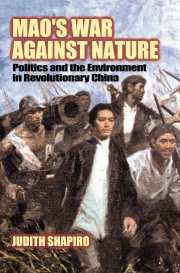Book contents
- Frontmatter
- Contents
- Chinese Measurement Equivalents
- Preface
- INTRODUCTION
- 1 POPULATION, DAMS, AND POLITICAL REPRESSION
- 2 DEFORESTATION, FAMINE, AND UTOPIAN URGENCY
- 3 GRAINFIELDS IN LAKES AND DOGMATIC UNIFORMITY
- 4 WAR PREPARATIONS AND FORCIBLE RELOCATIONS
- 5 THE LEGACY
- Notes
- Bibliography
- Index
- Plate section
INTRODUCTION
Published online by Cambridge University Press: 15 August 2009
- Frontmatter
- Contents
- Chinese Measurement Equivalents
- Preface
- INTRODUCTION
- 1 POPULATION, DAMS, AND POLITICAL REPRESSION
- 2 DEFORESTATION, FAMINE, AND UTOPIAN URGENCY
- 3 GRAINFIELDS IN LAKES AND DOGMATIC UNIFORMITY
- 4 WAR PREPARATIONS AND FORCIBLE RELOCATIONS
- 5 THE LEGACY
- Notes
- Bibliography
- Index
- Plate section
Summary
Most environmental problems have roots in human relationships and are ultimately social, political, and cultural problems. Not all environmental degradation is human-induced: natural processes such as floods and droughts can also reduce the earth's productivity, and non-human species also alter and transform ecosystems. However, we human beings are far more effective than other species in altering our environments in an effort to satisfy our needs, and our very success often makes us a danger to others and to ourselves. Unlike other species, moreover, we make conscious, contestable choices about how resources are used, who uses them, and how we understand ourselves in relation to nature.
Maoist China provides an example of extreme human interference in the natural world in an era in which human relationships were also unusually distorted. The period illustrates the relationship between political repression and environmental degradation, demonstrating the tragedy of this interface under extreme conditions. The environmental dynamics of the period suggest a congruence between violence among human beings and violence by humans toward the nonhuman world. When the Chinese people mistreated each other through suppression of intellectual freedoms, tyrannical utopianism, political labeling, ostracism, punishment, terror, and forcible relocations, they also treated nature badly.
The political dynamics of the Mao period as they affected nature are complex, however; they do not simply involve coercion of political victims from among the urban intellectual or Communist elite.
- Type
- Chapter
- Information
- Mao's War against NaturePolitics and the Environment in Revolutionary China, pp. 1 - 20Publisher: Cambridge University PressPrint publication year: 2001
- 1
- Cited by

